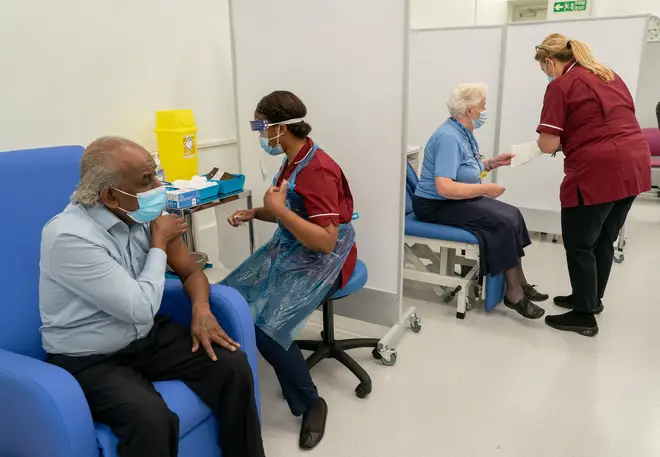
Clive Bull 1am - 4am
25 February 2021, 14:20 | Updated: 25 February 2021, 14:27

Care home providers have begun introducing a 'no jab, no job' policy for new and existing staff amid concerns about take up of the Covid-19 vaccine.
Care UK and Barchester, which run a total of more than 350 homes across the country, said it would be introducing the new rules to ensure the safety of their residents.
Barchester said it expects all staff to have the vaccine by April 23 and will only allow exemptions on medical grounds.
Around 82% of its staff have already received one of the jabs and two-thirds of staff at Care UK have received a first dose.
A Care UK spokesperson said: "We hope all colleagues, present and future, will see the benefits vaccination can bring to themselves, their families and the people living and working in our homes.
Read more: One in three care home workers turned down vaccine, JCVI boss tells MPs
"For new recruits, we now ask at both the application and interview stage whether they have had, or would be willing to have, the vaccination.
"This means, right from the outset, that they are fully aware of the need for new colleagues to be vaccinated as a requirement we make to keep residents in our homes safe. So far this has not proved a barrier for those keen to build a career with us.
"This approach is becoming increasingly common across the care home sector. For existing employees, we’ve found the vast majority of team members have been very keen to be vaccinated and have been coming in on their days off to do so."

Next CEO tells Nick Ferrari he's against vaccine passports
Employment law barrister and LBC presenter Daniel Barnett said on that any attempt dismiss staff could backfire on companies in court.
He warned that workers sacked because they had refused to get a Covid-19 jab could win a lawsuit against their employer on grounds of unfair dismissal.
He said: "I think any tribunal will say it's unfair to dismiss a member of staff who has legitimate concerns [about the vaccine].
"They don't have to be rabid anti-vaxxer but people who have legitimate concerns about the health benefits or risks of a vaccine."
Read more: Nearly 14 per cent of England's population has Covid-19 antibodies, major study shows
Mr Barnett also criticised Justice Secretary Robert Buckland for not providing clearer guidance on whether employers can dismiss staff and refuse to hire them based on vaccination.
He added: "He's saying there's an argument they, there's an argument they can't, but really they should discuss it with the unions they recognise, which isn't very clear guidance for a justice secretary.
"But in terms of existing employees, he is almost certainly right in the majority of cases that it would be very difficult to dismiss anyone who has more than two years' employment."

Asked whether NHS and care home staff should be forced to have a vaccine, Professor Anthony Harnden, deputy chairman of the Joint Committee on Vaccination and Immunisation, told the Science and Technology Committee: "Surgeons require hepatitis B vaccine to operate so they don't transmit hepatitis B to their patients.
"I don't think we're quite there with Covid.
"We do know from the Covid vaccination that doctors are one of the highest uptakes of vaccine - the national data suggest over 90% of doctors, about 80% of nurses and 66% of care home staff - where we do have a problem in terms of vaccine coverage.
Read more: 150,000 more people with learning disabilities to be prioritised for Covid-19 jabs
"We've never gone along the route of compulsory vaccination in this country and I think it's something we would need to debate more at a political level.
"There could be an argument, I agree, that if these vaccines prevent transmission - it was one of our rationales to put frontline healthcare workers in priority group two - was not only their exposure risk but that they were also treating lots of vulnerable older people who could potentially get the virus from them - would need to have some consideration.
"I don't know where we are going with this, it certainly wouldn't be a JCVI decision to make it compulsory."